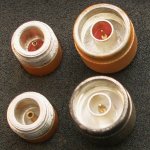Bill2k
Member
I'm trying to iron out the last few details for a yagi antenna built similar to the dimensions from K7MEM's website: Martin E. Meserve - K7MEM - VHF/UHF Yagi Antenna Design
From what I've read, this antenna has an impedance closer to 75 ohms. My question is... would it be more efficient to use 50 or 75 ohm coax to connect the antenna to my scanner which has 50 ohm impedance?
BTW, The antenna have a center frequency of around 868MHz.
From what I've read, this antenna has an impedance closer to 75 ohms. My question is... would it be more efficient to use 50 or 75 ohm coax to connect the antenna to my scanner which has 50 ohm impedance?
BTW, The antenna have a center frequency of around 868MHz.
Last edited:


